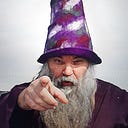Member-only story
What decades of paganism taught me about magic
Yes, it works, but no, not the way you probably think.
I spent more than two decades as a practicing modern pagan. The Wiccan reverence for nature offered a compelling framework for my environmentalism, and I found the community far more tolerant than other faith groups. Eventually I acknowledged that at heart I am a rational atheist with no interest in taking anyone’s dogma literally, although I’m still close with many of the same spiritual people. My biggest takeaway from those years relates to the popular concept of magic. Whenever the topic arises, people are often confused that I reconcile accepting the idea of magic with a scientific approach to my reality. Some elaboration seems in order.
First off, we’re not talking about stage magic. I’ve known a few people with sleight of hand skills sufficient to perform darned impressive card tricks, and I’m entertained by the elaborate illusions of performers like Penn and Teller, but this conversation has nothing to do with any of that. I’m talking about hanging out with witches, casting spells, conducting rituals, and making talismans. I was first introduced to modern paganism when I was eleven years old. I threw myself into it, learning everything I could. I fervently studied mythology, oracles like tarot cards, norse runes and horoscopes, and the…
